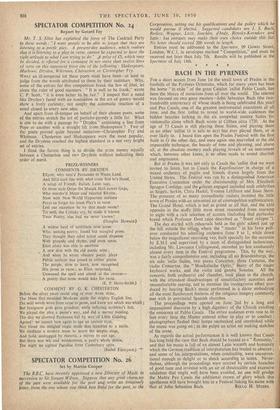SPECTATOR COMPETITION No. 24
Report by Gerard Fay
Mr. T. S. Eliot has explained the form of The Cocktail Party in these words : " I want people to be able to forget that they are listening to a poetic play. A present-day audience, which realises that it is listening to a play in verse, cannot be expected to have the
right attitude to what 1 am trying to do." 4 prize of £5, which may
be divided, is offered for a comment in not more than twelve lines of verse on this statement from one of the following : Shakespeare, Marlowe, Dryden, Whitman, Chesterton or Christopher Fry.
WHAT an ill-tempered lot these poets must have been—at least to
judge from the words attributed to them by their imitators. Why,
some of the entries for this competition break the law of libel, let
alone the rules of good manners. " It is well to be frank," wrote C. P. Scott, " it is even batter to be fair." I suspect that a mind
like Dryden's faced with an innovation in the art of poetry would show a lively curiosity, not simply, the automatic reaction of a
mind closed to every new idea.
And apart from ill-temper on behalf of their chosen poets, some of the entries stretch the art of pastiche-parody a little far. What is one to do with a passage by " Dryden " containing a line from Pope or another with a straight lift from Shakespeare ? Two of the poets proved quite beyond imitation—Christopher Fry and Whitman. Chesterton and Shakespeare were the most popular, and the Drydens reached the highest standard in a not very bright set of entries.
I think the fairest thing is to divide the prize money equally
between a Chesterton and two Drydens without indicating their order of merit. PRIZE-WINNERS
COMMENTS BY DRYDEN Ellyott, who turn'd Parnassus to Waste Land, And fill'd, each line with what came first to's Hand,
A scrap of French, Italian, Latin tags,
Or those stale Quips the Musick Hall names Gags, Who murder'd Metre and rejected Rhyme, Now with New World Hypocrisie sublime Prays us forget his latest Play's in verse Lest our reception be by that made worse!
Tis well, the Criticks cry, he made it known
Twas Poetry, else had we never known!
(Douglas Hawson.)
A witless herd of scribblers now arose
Who, seeking poetry, found but mangled prose.
They thought their rebel talent could dispense With prosody and rhyme, and even sense.
Eliot alone was able to combine
A new skin with the old poetic wine ; And when he wrote obscure poetic plays
Public acclaim was joined to critics' praise.
The people, slow to learn, now recognised His prose as verse ; so Eliot, surprised,
Unwound the spell and aimed at the reverse—
A .poetry that none would take for verse.
(E. P. Hcriz-Smith.)
COMMENT BY G. K. CHESTERTON Before the silver swan could sing or over Avon shine,
The Muse that moulded Marlowe made the mighty English line.
The wild words wove from verse to prose, and knew not which was which ;
But benignant gods gave grandeur, while inflicting scribbler's itch.
We played the play a purist's way, and did a sterner bidding, The day we climbed Parnassus hill by way of Little Gidding.
Agreed! we cannot turn again to ape an ancient style, Nor blend the mingled tragic mode that trembles to a smile.
We meditate a modern muse to storm the sceptic stage, And hold, undrugged by rhetoric, a mirror to our age.
But there was wit and wonderment, a poet's whole desire, The night we sighted Paradise from Canterbury spire.
(Isabel Finlayson.)














































 Previous page
Previous page